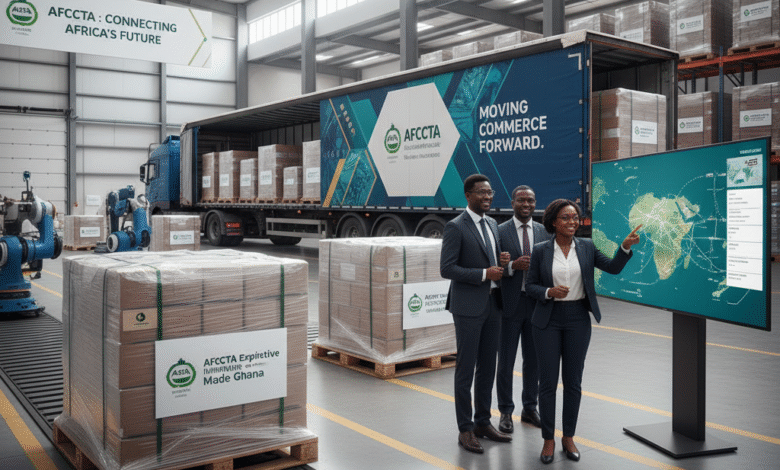Ghana’s AfCFTA Push: A Step Forward, But Can It Break Old Barriers?

For Ghanaian businesses, the African Continental Free Trade Area (AfCFTA) has always been pitched as a game changer, a single African market of 1.4 billion people and endless opportunities. Yet nearly five years after its launch, many traders say the lofty promises are still trapped in a web of bureaucracy, border delays, and unmet reforms.

Against this backdrop, the government is now taking a more practical step. Deputy Foreign Minister James Gyakye Quayson announced at the Made in Ghana Bazaar that local firms in cosmetics, garments, coconut oil, and food and beverages are being assisted to secure rules of origin certificates. These certificates are essential because without them, Ghanaian made products can be slapped with tariffs in other African countries, even under AfCFTA.
“This is not a small thing,” one exporter explained at the event. “With certification, my shea butter products can land in Nigeria or South Africa without extra duties. Without it, I simply cannot compete.”
But the optimism is tempered by reality. For years, the Ghana Union of Traders Association (GUTA) has raised alarm over the opaque and complex process of securing these certificates. Dr Joseph Obeng, GUTA’s president, recently argued that the system is weighed down by red tape and lacks transparency. “Traders must know clearly which goods qualify, otherwise the system only breeds mistrust,” he said.

Beyond certification, logistics remain a formidable hurdle. Many SMEs that manage to export under AfCFTA still face long delays at borders, costly transport charges, and inconsistent enforcement of trade rules. Perishable goods spoil, contracts are missed, and small businesses lose faith in the very agreement that was meant to empower them.
Value addition is another missing link. Dr Obeng notes that Africa cannot trade competitively if it remains focused on raw exports. “You sell what you have. If you do not have, how do you sell?” he said, urging stronger investment in processing industries. Ghana’s accelerated export programme, which aims to raise non traditional exports from $3.5 billion to $10 billion by 2030, reflects this push for value addition and diversification.
Still, Ghanaian traders remain cautious. For many, trading across Asia or Europe feels more predictable than doing business with neighbouring African states. Changing this mindset will require more than government handholding. It demands reliable infrastructure, harmonised tariffs, and better market information so traders in Kumasi or Tamale know where and how to sell across the continent.
The new certification support is therefore only one piece of the puzzle. Unless deeper reforms follow, AfCFTA risks being remembered as another well intentioned policy weighed down by bureaucracy.
For SMEs, the verdict is still out. Will AfCFTA become the gateway to growth and jobs that policymakers promise, or will it remain a grand idea caught in paperwork and politics?




